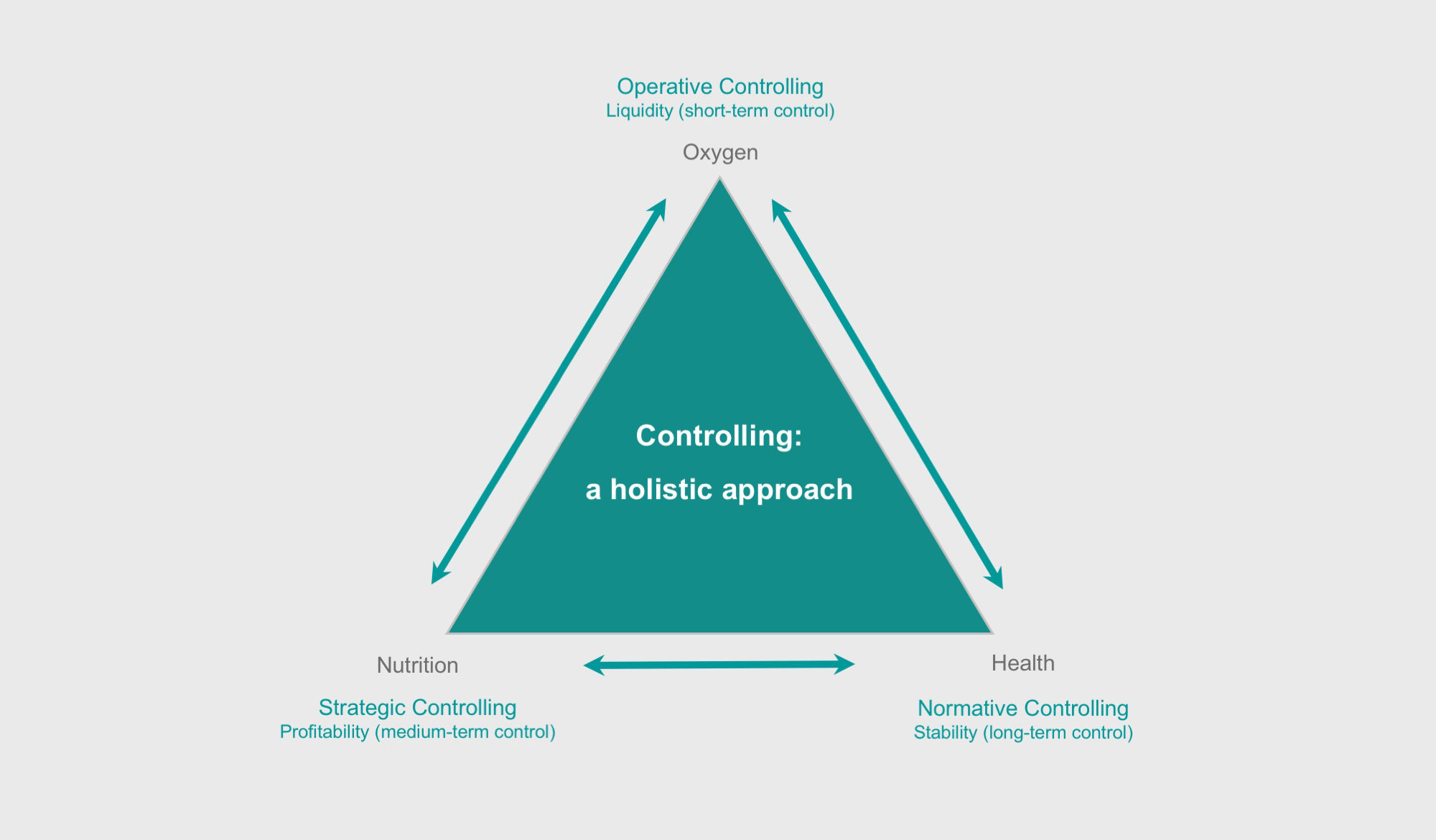




- Center for Strategic Management
- Center for Innovation
- Center for Start-up-Management
- Center for Digital Business Transformation
- Center for Governance & Compensation
- Center for Sustainability Management
- Center for Executive Coaching
- Center for Leadership
- Center for Change Management
- Center for Personal Leadership & Motivation
- Center for New Work
- Center for Communication
- Center for Rhetoric
- Center for Neuro Intelligent Leadership
- Center for Marketing Management
- Center for Brand Management
- Center for Online Marketing & Social Media
- Center for Resilient Marketing
- Center for Sales Communication
- Center for Financial Management
- Center for Mergers & Acquisitions
- Center for Controlling
- Center for International Management
- Center for Asia
Center for Controlling
"Controlling is always oriented towards the future". Despite the fact that the postulated future orientation is often contrary to the existing controlling tools, where mostly past-oriented values are analyzed and presented in sophisticated Excel spreadsheets, this phrase is often heard in practice or science and is a key element of a modern-oriented and decision based controlling system. The St. Gallen Center for Controlling addresses the challenges of a future-oriented controlling by linking useful information from the past, the present, and the future and processing the findings in the form of options and alternatives.
With this information available, decision- makers such as supervisory councils, managing directors, department or project managers can - on the basis of this information - decide on applications, projects or investments. Thereby, they take responsibility for results, while the controller is responsible for their transparency. Making this distinction, the term “Controlling” can be described as the result of such a division of responsibility. Another way to see it is the synonymous meaning of the verb “to control”, i.e. “to govern” or “to lead”.
The St. Gallen Center for Controlling focuses on this aspect of controlling. The different mechanisms by which a control system is controlled, led and governed should also apply to the system called "company" to control, lead and govern it into the future. But before we can take this step, we must define the target state, our objective - in the control system as well as in the company -, similar to a pilot who has to know the destination of his flight. Only when he knows his destination, he can prepare accordingly in order to reach his objective and correctly interpret the data, pointers and lights in the cockpit. He controls his aircraft towards his destination, making use of all kinds of information. Therefore, controlling always serves as a future-oriented instrument.
From the perspective of the corporate world, the following question arises: On what basis does controlling determines future targets? How does it know "where to fly the plane"? The answer lies in the holistic St. Gallen Management Model: responsible for a company's medium-term orientation is its strategy. Considering normative values, a strategy is setting clear objectives, which are then operationalized and translated into concrete measures. According to this classification, while following the St. Galler management approach, the St. Gallen Centre for Controlling divides the topic into three areas and furthermore offers the full range of practical know-how.

- Normative Controlling: Normative Controlling is based on requirements of the normative level such as values, ethical and moral base, corporate culture and social responsibility. With regards to controlling, a minimum equity ratio is one of the numbers company owners specify on the basis of normative reasons. Particularly noteworthy is the company's long-term basic orientation regarding the balance between stability and profitability targets.
- Strategic Controlling: On a strategic level, the objectives are set for the next three to five years. Based on the desired position in the market, the quantitative objectives such as sales, EBIT, cash flow, investment and operational costs are derived. On the one hand, they are used as a basis for determining how plausible the financial viability of strategic initiatives is. On the other hand, they serve as a guideline for operational controlling. Strategic Controlling is supplemented by non-financial indicators, accompanying the strategy implementation in the form of balanced cockpit systems and laying the basis for an integrated performance management system.
- Operative Controlling: Liquidity planning, quarterly and weekly reports are crucial to operational management responsibility. The main challenge lies in designing a reporting process that suits your company. The controlling work focuses on the essentials and avoids overly complex tools, in order to align reports purposefully and make sure they are understood and interpreted correctly.
Consulting Services
- Verification, adjustment or re-design of reporting systems (such as quarterly reporting, liquidity planning, monthly reports).
- Development and validation of investment calculation models (incl. sensitivity analysis and financial models)
- Producing and analyzing of business plans
- Supporting the implementation of modern budgeting systems (such as rolling forecasts, decentralized budgets, beyond budgeting approaches).
- Designing and developing holistic management cockpit systems (such as balanced scorecards and performance management systems).
SGMI Open Programs: Seminars
Head
Gilbert Malgiaritta, lic.oec.HSG
Executive Director "Open Programs" and Director of the Center for Controlling at SGMI Management Institute St. Gallen
Gilbert Malgiaritta holds a degree in Business Administration from the University of St. Gallen (lic.oec. HSG) with specialization in Finance, Accounting and Controlling.
As executive director he is responsible for conceptual design, planning and development of courses for open programs and masters & diplomas. The programs aim to provide field tested and application-oriented approaches. The focus is on offering management education tailored to the target audience that considers the individual needs of the executive.
As a specialist in financial management and controlling, he is characterized by his vast experience as a teacher, coach, and consultant. For years, he has been training managers at all levels in the areas of financial management, controlling, profit management and strategic controlling, earning highest customer satisfaction. His range of service covers the rich variety of finance and accounting for SMEs as well as large corporations. His work focuses, among others, on the following areas:
- Management Tools of Financial Management and Controlling (Control Reports)
- Financial and Indicators Analysis
- Liquidity Planning, Planning and Budgeting, Business Plan
- Investment and Profitability Calculations
- Cost Accounting Systems
- Strategic Controlling

